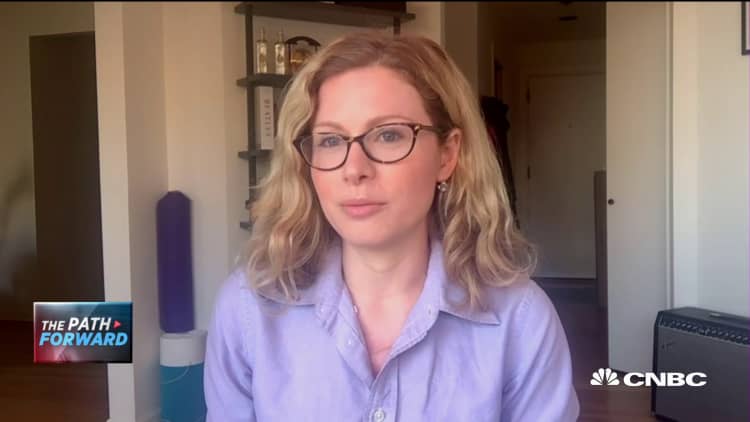
Digital health is one of the few sectors of the economy that's growing during the coronavirus pandemic.
Omada Health, a company that sells virtual and in-person tools for managing chronic disease, is capitalizing on the sudden interest from investors.
The company just pulled in $57 million from investment fund Perceptive Advisors, which focuses on health and life sciences, and it used some of that money to buy a smaller digital health start-up called Physera, which specializes in virtual physical therapy. Approximately $30 million of the total sum was used for the acquisition, a person familiar with the deal told CNBC.
Omada got its start in 2011 to bring new digital tools, such as smartphone-based coaches and wireless weight scales, to the Diabetes Prevention Program. The DPP, which is led by the U.S. Centers for Disease Control and Prevention, is designed to help people at risk for diabetes — approximately 1 in 3 American adults — avoid getting the disease by altering their lifestyle. Omada's idea was to make as much of the program virtual as possible to help it scale, and to raise enough funds along the way for clinical studies to ensure it worked.
Omada has raised more than $250 million, making it one of the most highly valued digital health companies. When it raised its previous round in 2019, the company was valued at $600 million. It currently competes with Livongo, which went public in 2019 and is reporting major growth since the beginning of the pandemic.
The digital health sector overall is expected to be worth more than $500 billion by 2025.
In the past five years, Omada has expanded its scope to offer more services tailored to those with behavioral health challenges, as well as a range of cardiovascular conditions. Many of the patients it treats have overlapping conditions, known as co-morbidities — for example they might have diabetes and struggle with depression.
By scooping up Physera, Omada moves into a new arena: virtually administered physical therapy. When workers are experiencing pain and aren't getting the help they need, they miss work or are less productive. Some will opt to get expensive and occasionally unnecessary surgeries down the road.
It's a massive problem and a huge source of health care costs. Reports have found that as many as 1 in 2 American adults are experiencing a musculoskeletal condition. Making matters worse, the country is experiencing a national shortage of providers. By 2025, an additional 27,000 physical therapists will be needed to meet growing demand. The annual average direct cost for musculoskeletal health care is estimated to be more than $980 billion.
So for companies, services such as Physera offer them a way to avoid downstream costs.
Both Omada and Physera sell to health plans and employers, which cover the full or partial cost of the service. Medicare and Medicaid have been slower to cover virtual care services, but both Omada and Physera's execs say they are seeing the regulatory landscape shift in their favor. During the pandemic, the federal government has agreed to pay for virtual visits and check-ins to ensure that people who are at high risk for the virus — and don't want to leave their homes — can still get medical care.
"Telehealth is here to stay," said Omada CEO Sean Duffy. "It's more important than it's ever been, and consumer expectations are changing now that more people have been introduced."
Physera CEO Y. Dan Rubinstein, who previously ran product at Palantir and worked as a director of product management at Facebook, said his company has seen "tremendous growth ever since Covid-19 started." Rubinstein said some employers and health plans are rolling out the service more quickly now and skipping the limited release phase because there's such a need for online health options.
"People are canceling their appointments and clinics aren't seeing patients, and yet the need still exists for them to be treated," he said.
Rubinstein said his start-up was starting to hear from outside investors before making the decision to sell.
"For us, we decided it was the right move when we asked the question of how can we reach the most patients," he said.


